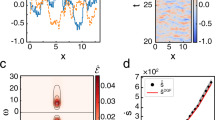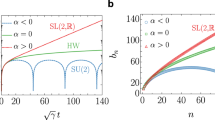Abstract
Physical systems powering motion and creating structure in a fixed amount of time dissipate energy and produce entropy. Whether living, synthetic or engineered, systems performing these dynamic functions must balance dissipation and speed. Here, we show that rates of energy and entropy exchange are subject to a speed limit—a time–information uncertainty relation—imposed by the rates of change in the information content of the system. This uncertainty relation bounds the time that elapses before the change in a thermodynamic quantity has the same magnitude as its s.d. From this general bound, we establish a family of speed limits for heat, dissipated/chemical work and entropy depending on the experimental constraints on the system and its environment. In all of these inequalities, the timescale of transient dynamical fluctuations is universally bounded by the Fisher information. Moreover, they all have a mathematical form that mirrors the Mandelstam–Tamm version of the time–energy uncertainty relation in quantum mechanics. These bounds on the speed of arbitrary observables apply to transient systems away from thermodynamic equilibrium, independent of the physical constraints on the stochastic dynamics or their function.
This is a preview of subscription content, access via your institution
Access options
Access Nature and 54 other Nature Portfolio journals
Get Nature+, our best-value online-access subscription
$29.99 / 30 days
cancel any time
Subscribe to this journal
Receive 12 print issues and online access
$209.00 per year
only $17.42 per issue
Buy this article
- Purchase on Springer Link
- Instant access to full article PDF
Prices may be subject to local taxes which are calculated during checkout


Similar content being viewed by others
Data availability
The data sets generated and/or analysed during the current study are available from the corresponding author on reasonable request.
Code availability
The codes generated and used during the current study are available from the corresponding author on reasonable request.
References
Callen, H. B. Thermodynamics and an Introduction to Thermostatistics 2nd edn (Wiley, 1985).
Mandelstam, L. & Tamm, I. The uncertainty relation between energy and time in non-relativistic quantum mechanics. J. Phys. USSR 9, 249–254 (1945).
Margolus, N. & Levitin, L. B. The maximum speed of dynamical evolution. Physica D 120, 188–195 (1998).
Pietzonka, P. & Seifert, U. Universal trade-off between power, efficiency, and constancy in steady-state heat engines. Phys. Rev. Lett. 120, 190602 (2018).
Gingrich, T. R., Horowitz, J. M., Perunov, N. & England, J. L. Dissipation bounds all steady-state current fluctuations. Phys. Rev. Lett. 116, 120601 (2016).
Nicholson, S. B., del Campo, A. & Green, J. R. Nonequilibrium uncertainty principle from information geometry. Phys. Rev. E 98, 032106 (2018).
Barato, A. C., Chetrite, R., Faggionato, A. & Gabrielli, D. Bounds on current fluctuations in periodically driven systems. New J. Phys. 20, 103023 (2018).
Dechant, A. Multidimensional thermodynamic uncertainty relations. J. Phys. A 52, 035001 (2018).
Uffink, J. & van Lith, J. Thermodynamic uncertainty relations. Found. Phys. 29, 655–692 (1999).
Schlögl, F. Thermodynamic uncertainty relation. J. Phys. Chem. Solids 49, 679–683 (1988).
Barato, A. C. & Seifert, U. Thermodynamic uncertainty relation for biomolecular processes. Phys. Rev. Lett. 114, 158101 (2015).
Pietzonka, P., Ritort, F. & Seifert, U. Finite-time generalization of the thermodynamic uncertainty relation. Phys. Rev. E 96, 012101 (2017).
Maes, C. Frenetic bounds on the entropy production. Phys. Rev. Lett. 119, 160601 (2017).
Jarzynski, C. Equalities and inequalities: irreversibility and the second law of thermodynamics at the nanoscale. Annu. Rev. Condens. Matter Phys. 2, 329–351 (2011).
Seifert, U. Stochastic thermodynamics, fluctuation theorems and molecular machines. Rep. Prog. Phys. 75, 126001 (2012).
Van den Broeck, C. & Esposito, M. Ensemble and trajectory thermodynamics: a brief introduction. Physica A 418, 6–16 (2015).
Boyd, A. B. & Crutchfield, D. M. J. P. Identifying functional thermodynamics in autonomous Maxwellian ratchets. New J. Phys. 18, 023049 (2016).
Sagawa, T. & Ueda, M. in Nonequilibrium Statistical Physics of Small Systems: Fluctuation Relations and Beyond (eds Klages, R. et al.) 181–211 (Wiley-VCH, 2013).
Hasegawa, Y. & Vu, T. V. Uncertainty relations in stochastic processes: an information inequality approach. Phys. Rev. E 99, 062126 (2019).
Green, J. R., Costa, A. B., Grzybowski, B. A. & Szleifer, I. Relationship between dynamical entropy and energy dissipation far from thermodynamic equilibrium. Proc. Natl Acad. Sci. USA 110, 16339–16343 (2013).
Zieliński, B. & Zych, M. Generalization of the Margolus-Levitin bound. Phys. Rev. A 74, 034301 (2006).
Margolus, N. The finite-state character of physical dynamics. Preprint at https://arxiv.org/abs/1109.4994 (2011).
Taddei, M. M., Escher, B. M., Davidovich, L. & de Matos Filho, R. L. Quantum speed limit for physical processes. Phys. Rev. Lett. 110, 050402 (2013).
del Campo, A., Egusquiza, I. L., Plenio, M. B. & Huelga, S. F. Quantum speed limits in open system dynamics. Phys. Rev. Lett. 110, 050403 (2013).
Deffner, S. & Lutz, E. Quantum speed limit for non-Markovian dynamics. Phys. Rev. Lett. 111, 010402 (2013).
García-Pintos, L. & del Campo, A. Quantum speed limits under continuous quantum measurements. New J. Phys. 21, 033012 (2019).
Shanahan, B., Chenu, A., Margolus, N. & del Campo, A. Quantum speed limits across the quantum-to-classical transition. Phys. Rev. Lett. 120, 070401 (2018).
Okuyama, M. & Ohzeki, M. Quantum speed limit is not quantum. Phys. Rev. Lett. 120, 070402 (2018).
Takahashi, K. & Ohzeki, M. Conflict between fastest relaxation of a Markov process and detailed balance condition. Phys. Rev. E 93, 012129 (2016).
Shiraishi, N., Funo, K. & Saito, K. Speed limit for classical stochastic processes. Phys. Rev. Lett. 121, 070601 (2018).
Horowitz, J. M. & Gingrich, T. R. Thermodynamic uncertainty relations constrain non-equilibrium fluctuations. Nat. Phys. 16, 15–20 (2019).
Shannon, C. E. A mathematical theory of communication. Bell Syst. Tech. J. 27, 623–656 (1948).
Reif, F. Fundamentals of Statistical and Thermal Physics (Waveland, 2009).
Messiah, A. Quantum Mechanics Vol. 1 (North-Holland, 1961).
Salamon, P. & Berry, S. R. Thermodynamic length and dissipated availability. Phys. Rev. Lett. 51, 1127–1130 (1983).
Salamon, P., Nulton, J. D. & Berry, R. S. Length in statistical thermodynamics. J. Chem. Phys. 82, 2433–2436 (1985).
Wootters, W. K. Statistical distance and Hilbert space. Phys. Rev. D 23, 357–362 (1981).
Braunstein, S. L. & Caves, C. M. Statistical distance and the geometry of quantum states. Phys. Rev. Lett. 72, 3439–3443 (1994).
Crooks, G. E. Measuring thermodynamic length. Phys. Rev. Lett. 99, 100602 (2007).
Flynn, S. W., Zhao, H. C. & Green, J. R. Measuring disorder in irreversible decay processes. J. Chem. Phys. 141, 104107 (2014).
Nichols, J. W., Flynn, S. W. & Green, J. R. Order and disorder in irreversible decay processes. J. Chem. Phys. 142, 064113 (2015).
Frieden, B. R. Science from Fisher Information 2nd Ed. (Cambridge University Press, 2004).
Heseltine, J. & Kim, E. Novel mapping in non-equilibrium stochastic processes. J. Phys. A 49, 175002 (2016).
Kim, E., Lee, U., Heseltine, J. & Hollerbach, R. Geometric structure and geodesic in a solvable model of nonequilibrium process. Phys. Rev. E 93, 062127 (2016).
Boixo, S., Flammia, S. T., Caves, C. M. & Geremia, J. Generalized limits for single-parameter quantum estimation. Phys. Rev. Lett. 98, 090401 (2007).
Ito, S. & Dechant, A. Stochastic time evolution, information geometry and the Cramér-Rao bound. Phys. Rev. X 10, 021056 (2020).
Casella, G. & Berger, R. L. Statistical Inference Vol. 2 (Duxbury, 2002).
Cover, T. M. & Thomas, J. A. Elements of Information Theory 2nd edn (Wiley, 2006).
Groot, S. R. D. & Mazur, P. Non-Equilibrium Thermodynamics Vol. 1 (Dover, 1984).
Grant, J., Jack, R. L. & Whitelam, S. Analyzing mechanisms and microscopic reversibility of self-assembly. J. Chem. Phys. 135, 214505 (2011).
Acknowledgements
We acknowledge support from the National Science Foundation under grant no. 1856250 and the US Army Research Laboratory and the US Army Research Office under grant no. W911NF-14-1-0359. This work is further supported by the John Templeton Foundation, UMass Boston project no. P20150000029279, DoE grant no. DE-SC0019515, AFOSR MURI project ‘Scalable Certification of Quantum Computing Devices and Networks’, DoE ASCR Quantum Testbed Pathfinder programme (award no. DE-SC0019040), DoE BES QIS programme (award no. DE-SC0019449), DoE ASCR FAR-QC (award no. DE-SC0020312), NSF PFCQC programme, AFOSR, ARO MURI, ARL CDQI, and NSF PFC at JQI.
Author information
Authors and Affiliations
Contributions
S.B.N., L.P.G.P., A.dC. and J.R.G. contributed to the design and implementation of the research, to the analysis of the results and to the writing of the manuscript.
Corresponding author
Ethics declarations
Competing interests
The authors declare no competing interests.
Additional information
Publisher’s note Springer Nature remains neutral with regard to jurisdictional claims in published maps and institutional affiliations.
Supplementary information
Supplementary Information
Supplementary Figs. 1–4, results and discussion.
Rights and permissions
About this article
Cite this article
Nicholson, S.B., García-Pintos, L.P., del Campo, A. et al. Time–information uncertainty relations in thermodynamics. Nat. Phys. 16, 1211–1215 (2020). https://doi.org/10.1038/s41567-020-0981-y
Received:
Accepted:
Published:
Issue Date:
DOI: https://doi.org/10.1038/s41567-020-0981-y
This article is cited by
-
Diversity of information pathways drives sparsity in real-world networks
Nature Physics (2024)
-
Geometric thermodynamics for the Fokker–Planck equation: stochastic thermodynamic links between information geometry and optimal transport
Information Geometry (2024)
-
Unifying speed limit, thermodynamic uncertainty relation and Heisenberg principle via bulk-boundary correspondence
Nature Communications (2023)
-
Quantum Uncertainty Dynamics
Foundations of Physics (2023)
-
Ultimate speed limits to the growth of operator complexity
Communications Physics (2022)



